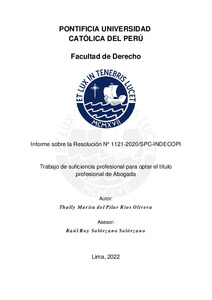| dc.contributor.advisor | Solórzano Solórzano, Raúl Roy | |
| dc.contributor.author | Rios Olivera, Thally Marita del Pilar | |
| dc.date.accessioned | 2022-08-03T22:33:27Z | |
| dc.date.available | 2022-08-03T22:33:27Z | |
| dc.date.created | 2022 | |
| dc.date.issued | 2022-08-03 | |
| dc.identifier.uri | http://hdl.handle.net/20.500.12404/22928 | |
| dc.description.abstract | El presente informe tiene como objetivo analizar los aspectos jurídicamente relevantes de
la Resolución N°. 1121-2020/SPC-INDECOPI; en la cual la Sala Especializada en
Protección al Consumidor del Instituto Nacional de Defensa de la Competencia y de la
Protección de la Propiedad Intelectual (Indecopi) aborda el tema de discriminación en el
consumo por motivo de sexo, específicamente, en el caso de un hombre al que se le
denegó el uso de la fila de trato preferente por no tener la condición de mujer, pese a que
llevaba a su menor hijo en brazos.
En tal sentido, el presente informe examinará los argumentos desarrollados por Indecopi
y por las partes para solucionar la controversia. Por tal motivo, se revisará la figura de la
discriminación en el consumo tanto en la doctrina como en las resoluciones del Indecopi
y el Tribunal Constitucional. Además, se analizará si la parte denunciada también habría
podido incurrir en una presunta infracción al trato preferente. También se examinará si
los medios probatorios presentados por la parte denunciante fueron suficientes para
acreditar la conducta infractora. | es_ES |
| dc.description.abstract | The aim of this report is to go over the legally relevant aspects of Resolution N°. 1121-
2020/SPC-INDECOPI; in which the Specialized Chamber for Consumer Protection of
the National Institute for the Defense of Free Competition and Protection of Intellectual
Property (Indecopi) addresses the issue of discrimination in consumption based on sex,
specifically, in the case of a man who was denied the use of the preferential treatment
row for not having the status of a woman, despite the fact that he was carrying his child
in his arms.
In that regard, this report will examine the arguments presented by Indecopi and by the
parties to resolve the controversy. Accordingly, the figure of discrimination in
consumption will be reviewed in the doctrine and in the resolutions of Indecopi and the
Constitutional Court. Furthermore, a subject to be analyzed is whether the accused party
could have also incurred in an alleged violation of preferential treatment. It will also be
examined whether the evidence presented by the complaining party was sufficient to
prove the offending conduct. | es_ES |
| dc.language.iso | spa | es_ES |
| dc.publisher | Pontificia Universidad Católica del Perú | es_ES |
| dc.rights | info:eu-repo/semantics/closedAccess | es_ES |
| dc.subject | Protección del consumidor--Perú--Estudio de casos | es_ES |
| dc.subject | Protección del consumidor--Legislación--Perú | es_ES |
| dc.subject | Consumidores--Perú | es_ES |
| dc.subject | Discriminación | es_ES |
| dc.title | Informe sobre la Resolución N° 1121-2020/SPC-INDECOPI | es_ES |
| dc.type | info:eu-repo/semantics/bachelorThesis | es_ES |
| thesis.degree.name | Abogado | es_ES |
| thesis.degree.level | Título Profesional | es_ES |
| thesis.degree.grantor | Pontificia Universidad Católica del Perú. Facultad de Derecho. | es_ES |
| thesis.degree.discipline | Derecho | es_ES |
| renati.advisor.dni | 09998199 | |
| renati.advisor.orcid | https://orcid.org/0000-0002-3580-7109 | es_ES |
| renati.author.dni | 73758352 | |
| renati.discipline | 215106 | es_ES |
| renati.juror | Pazos Hayashida, Javier Mihail | es_ES |
| renati.juror | Solórzano Solórzano, Raúl Roy | es_ES |
| renati.juror | Durand Carrion, Julio | es_ES |
| renati.level | https://purl.org/pe-repo/renati/level#tituloProfesional | es_ES |
| renati.type | https://purl.org/pe-repo/renati/type#trabajoDeSuficienciaProfesional | es_ES |
| dc.publisher.country | PE | es_ES |
| dc.subject.ocde | https://purl.org/pe-repo/ocde/ford#5.05.01 | es_ES |





